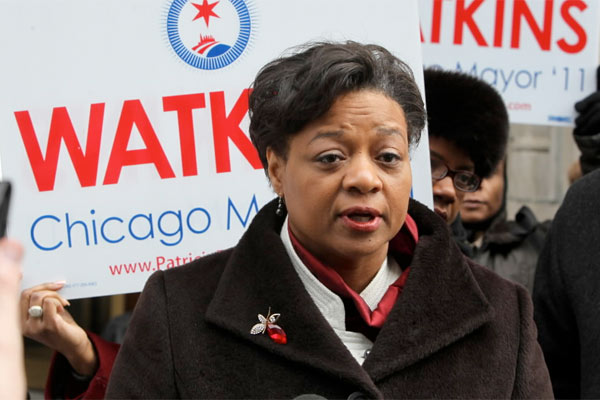
Mayoral candidate Patricia Watkins has seen her share of tough times—she spent her formative years at Cabrini-Green, she was addicted to drugs at one point, and her daughter died in a plane crash at 17.
The 53-year-old community organizer who founded Target Area Development Corp., a “grassroots social justice organization,” has been in the mayor’s race from the start. But the first-time candidate has polled as low as one percent, and has been stuck at the also-ran level—not invited to any of the debates, including tonight’s City Club/Chicago Tribune debate. The media—with the exception of Sun-Times columnists Mary Mitchell and Laura Washington—have largely ignored her.
She was suddenly in demand this week as news broke that the Appellate Court had ruled Rahm Emanuel ineligible to run. If the Illinois Supreme Court reverses that decision, as I predict it will, Dr. Watson—the high-school dropout-turned-drill-press-operator earned her PhD in 2009 from Capella University, an online, for-profit institution—will likely lapse back into obscurity. But for the moment, her prospects have brightened.
Here, the highlights of our Tuesday conversation:
CF: Has anyone asked you to step aside so that you don’t dilute support that might go to Carol Moseley Braun and put her in the April 5th runoff?
PW: I have been approached several times by Carol Moseley Braun, face-to-face [at candidate forums]. She said she thought I had a bright future and that she thinks I should join her campaign.
CF: I heard you say on a radio show Saturday that you wouldn’t vote for Moseley Braun if she were the only name on the ballot. You called her “a failure” and “an embarrassment to me as a woman.”
PW: I think she’s been missing in action. I didn’t even know she still lived in Chicago. All the challenges we face in this city, and we haven’t heard anything from her.
CF: You have been boasting that you out-fundraised Moseley Braun—about half a million dollars to Braun’s $446,000. But $296,000 came from your pastor [Joseph Stanford, pastor of the Ambassadors For Christ Ministries], and there were some eyebrows raised about that, as well as the fact that you and Stanford live in the same house on West Washington Boulevard.
PW: It was from his pension. He took his pension and gave $300,000 of it to the campaign. [The house] is a 5,200-square-foot building. He’s an international pastor; he’s hardly at the house, and his wife is there and his two kids.
CF: Your circumstances growing up were difficult, and a world apart from the frontrunners in the race.
PW: My mom was a civil rights activist. My dad was a cab driver. He had been in a terrible car accident and couldn’t work, so my mom had to go to work. She had a sixth-grade education. She went back to school and got an elementary school diploma, a high-school diploma, and then a college degree. She was eventually promoted to director of respiratory care at Provident Hospital.
CF: You lived at Cabrini-Green from age 7 through 12 and then moved to the South Side after your mother established herself. Any thoughts on the demolition of that housing project?
PW: The way it was set up it was doomed from the start. If you take any building and you take off the front door and the back door and make a breezeway so people can walk straight through, everybody in the building will become prey to anything and anybody who happened to stop by. We [her four sisters and two brothers] didn’t realize it was violent because it was all we knew. We had a toilet that worked and finally running water in the sink. [Because the rent was subsidized] we had more food. I remember that distinctly—not having enough food before—but when I moved to Cabrini we had food on a regular basis.
CF: Mary Mitchell described you as a “reformed drug addict.” True?
PW: My mom worked in the daytime and went to school at night. Seven kids running around by themselves, having plenty of fun. I was using drugs, [at age] 11 or 12. When we moved to the South Side, kids had much more money, access to many other kinds of drugs, that’s when it became cocaine. When I was 19, I was addicted.
CF: How did you beat the addiction?
PW: I went into a church in Englewood and I made peace with God. I was 21. There was a preacher there that day and he said, “Anybody need anything from God, come up.” I said, “I’m a drug addict and I want to be free.” [The preacher] rolled his sleeves up and he showed me his arms where he had tracks, where he had cut his wrists and tried to kill himself and he said, “God delivered me, and today he’s going to deliver you.” When he prayed for me I fell out [of consciousness] and when I came to the habit was gone. I never had any cold turkey side effects. From that point, I began to try to find out how I could help other people try to be free from different types of monsters—not just drug addiction, but poverty and exclusion and isolation.
CF: What would you do if you were elected mayor? [for more details see her answers to theChicago Tribune editorial board questionnaire.
PW: Make Chicago the transportation center of the world. I would encourage organizing within communities so they can solve some of their own problems, and I would work to bring the murders down—in the first two years, bring down 20 percent using [programs such as] CeaseFire and Safe Passage. I would set up community councils to drive school reform; put an educator in the top spot and have an elected school board, which would include some members appointed by me. To expand small business, I would waive the fees for new entrepreneurs for two years.
Photograph: Chicago Tribune


